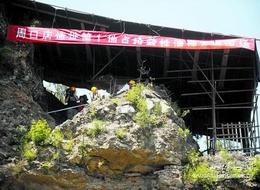
On June 24,China formally starts a large-scale rescue excavation project in Zhoukoudian, 72 years after its last excavation efforts of comparable scale in 1937.
Located 50 kilometres southwest to Beijing's city center, the legendary site boasts the discovery of Sinanthropus, also nicknamed "Peking Man". The launch of the new project coincides with the eightieth anniversary of the discovery of the full skull of Peking Man.
The excavation covers 20 square metres of the first site of the west section of the cave, which is the heart of Zhoukoudian and where Peking Man was first found, said Gao Xing, the team leader of the project and Vice Director of the Institute of Vertebrate Paleontology and Paleoanthropology (IVPP), CAS.
This excavation project is an emergent response to the frequent and increasing danger of landslide and rock fall. Preliminary survey has started as early as May. The first phase of excavation will last until late July. General cleanup and systematic sampling will follow up from August to October.
The Zhoukoudian archaeological site was first discovered by the Swedish archaeology Johan Gunnar Andersson, a science consultant to China's then Beiyang Government.
Large scale excavation between 1927 and 1929 culminated in the discovery of a full skull by Chinese archaeologist Pei Wenzhong on Dec. 2nd, 1929. Following excavation efforts were forced to a halt by the outbreak of Sino-Japanese war in 1937.
Smaller scales of excavation projects resumed after the establishment of P. R. China. Among them the 1949,1951, 1966, 1978-1983 and 2003 excavations are regarded as landmarks.
According to Gao, so far more than 200 fossils, about 100,000 pieces of lithic tools, 98 mammal fossils and 62 bird fossils have been found on the site.
The new project is especially interesting in the sense that in March, Gao and his colleague Shen Guanjun from the Nanjing Normal University advanced the "age" of Peking Man by 200,000 years by employing a new radioactive dating method. Before this March, Chinese archaeologists generally believed Peking Man lived 400,000 to 500,000 years ago. They wish the new project may bring out more proof of the famous man's real age.
Related News
Photos
More>>trade
market
finance
- IMHE and Chongqing University Sign Science and Technology Strategic Cooperation
- CAS Vice President Inspects CSNS and Daya Bay Reactor Neutrino Experiment
- Dinosaurs with Bird-like Wrists
- IMHE Makes New Progress on UAV Aerial Remote Sensing Technology and Application
- IHB Researchers Rescue Yangtze Finless Porpoises in Poyang Lake





